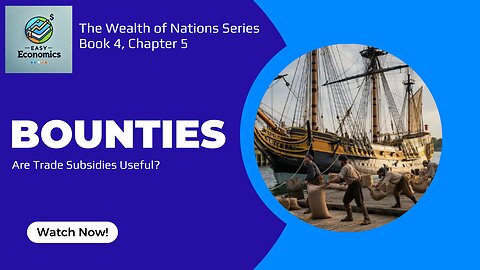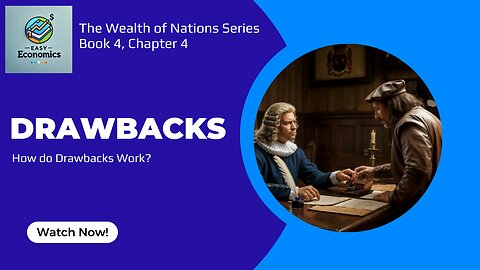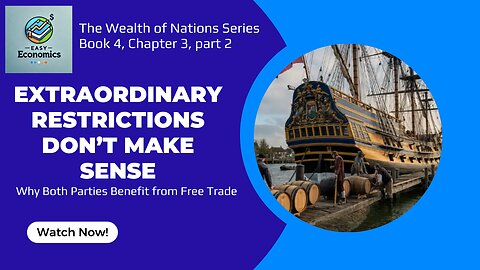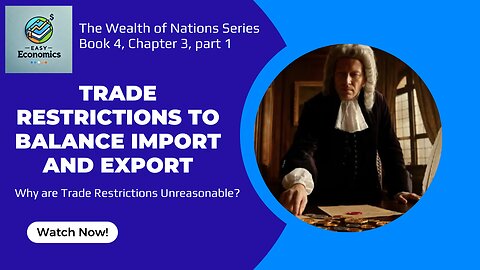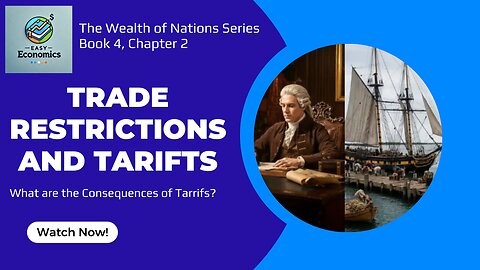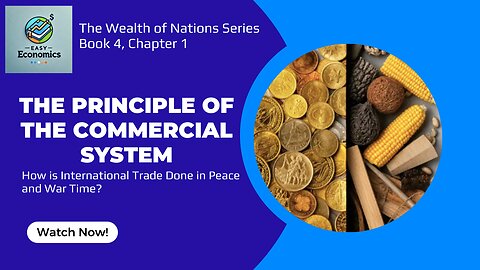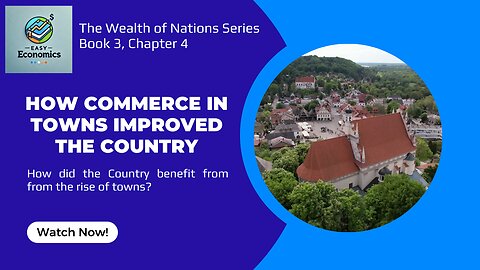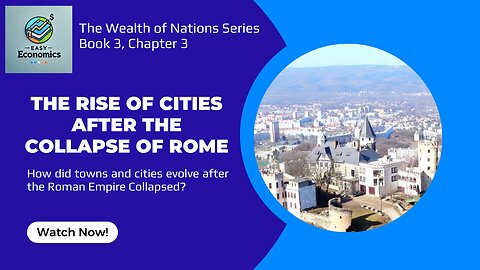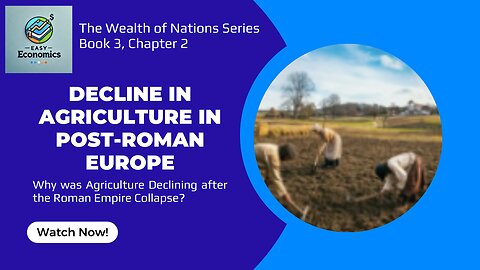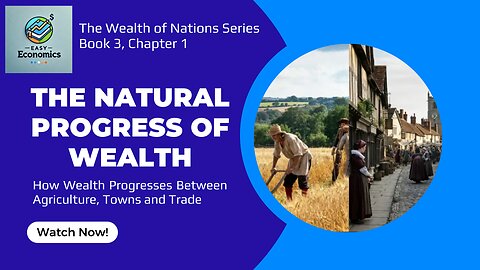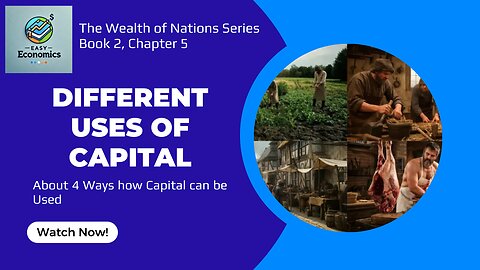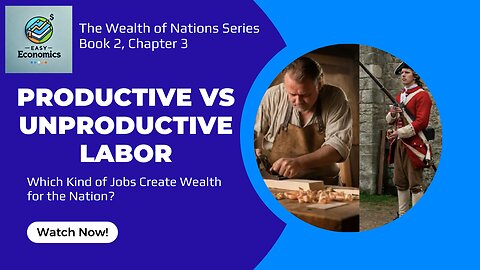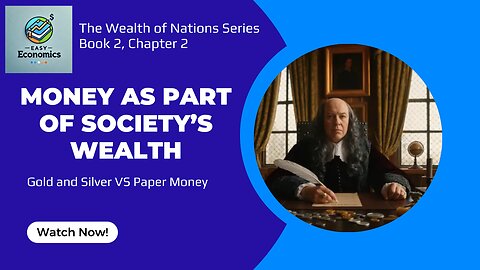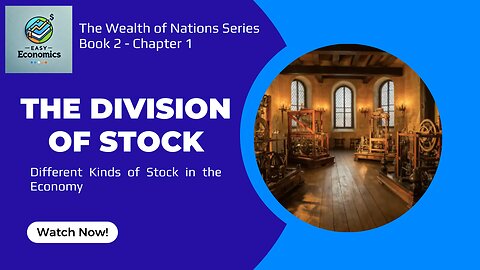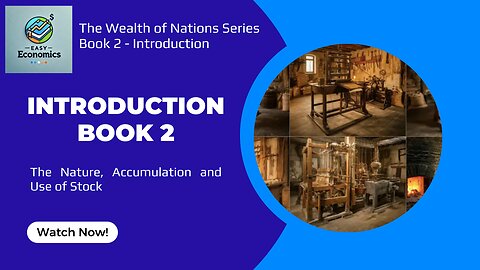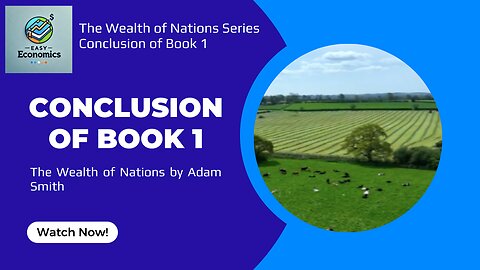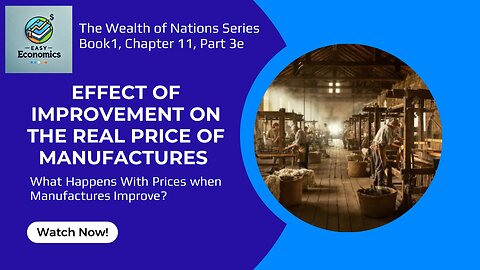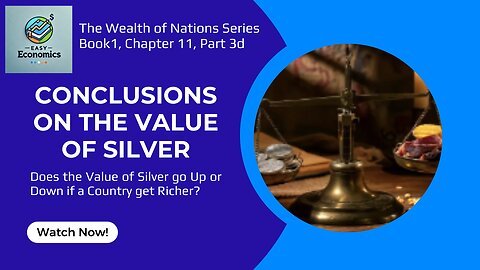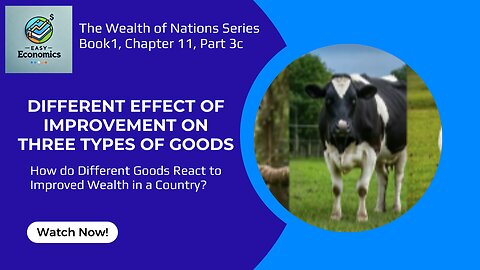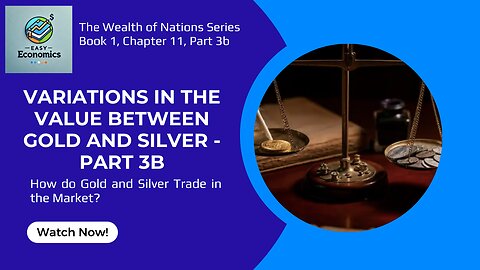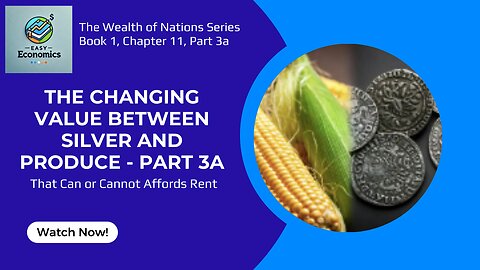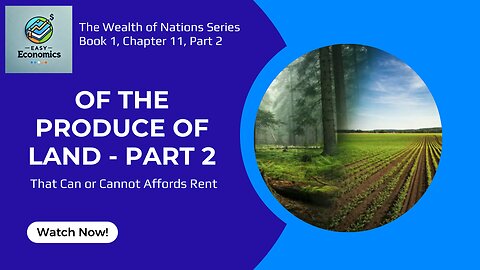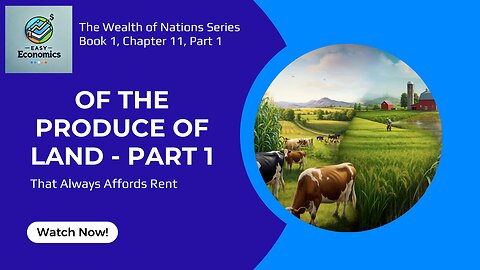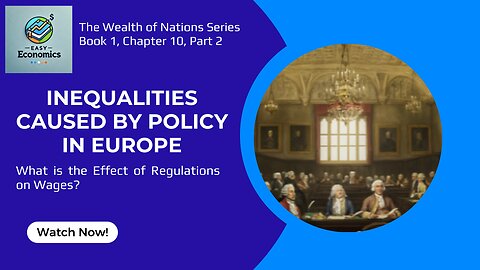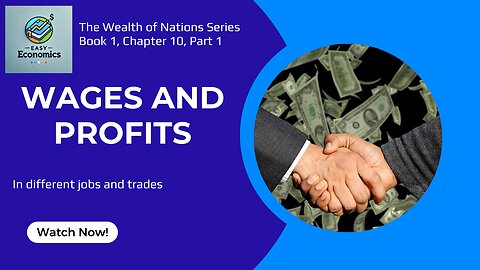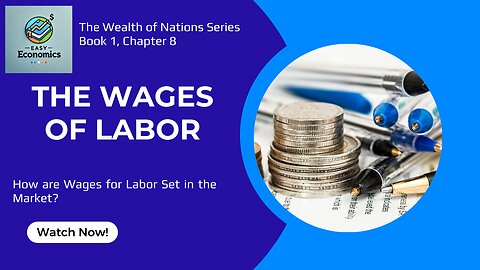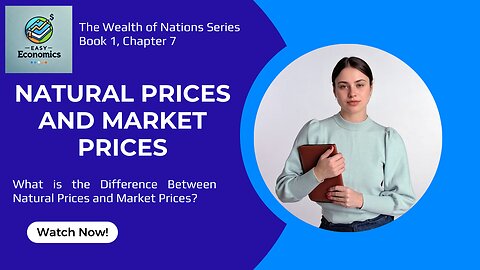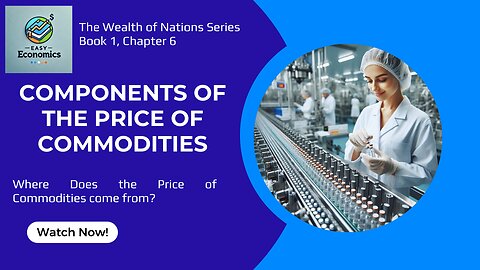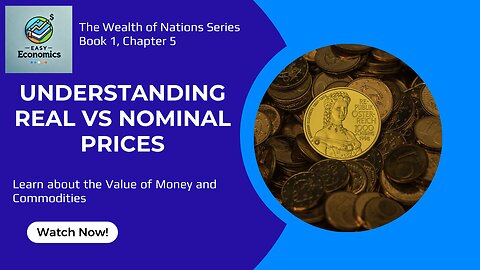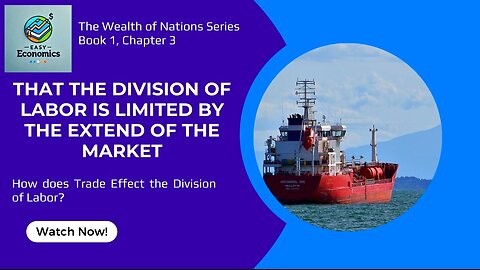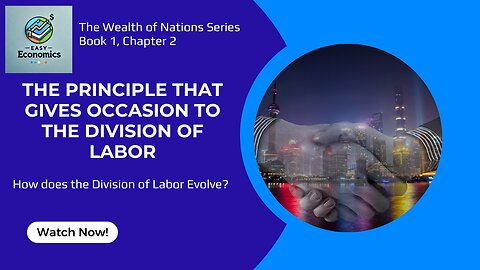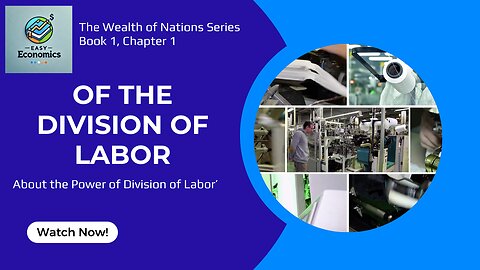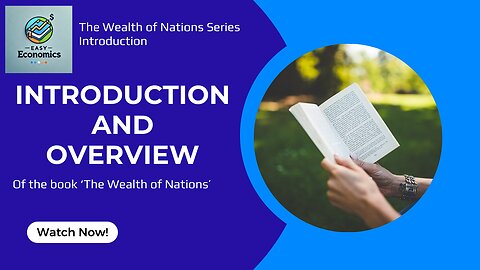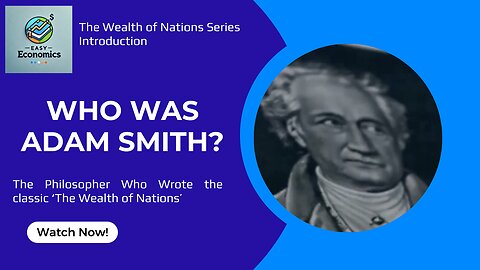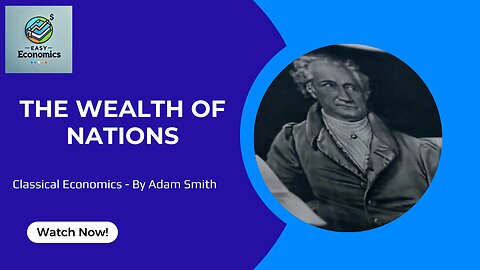Premium Only Content
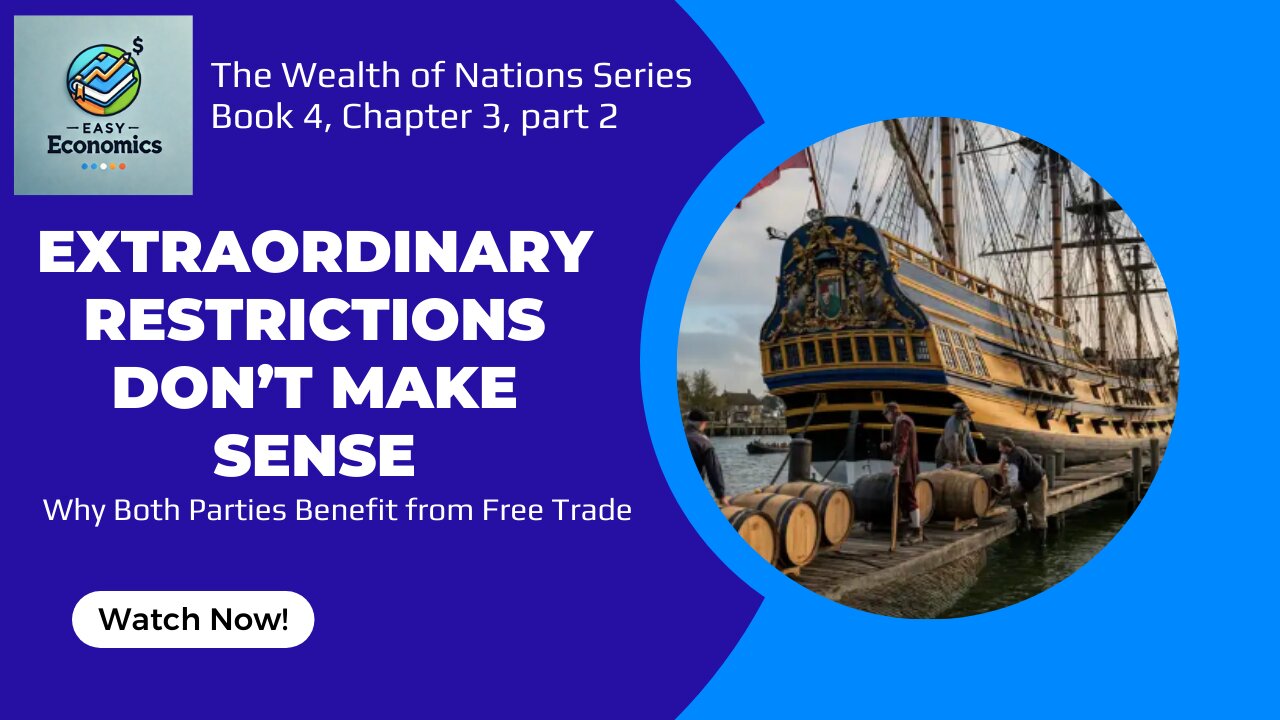
The Wealth of Nations Book 4 Chapter 5 - Bounties, The Hidden Cost of Subsidies
The Wealth of Nations Book 4 Chapter 4 - Understanding Drawbacks in International Trade
The Wealth of Nations Book 4 Chapter 3 Part 2 - Why Extraordinary Restrictions Don't Make Sense
The Wealth of Nations Book 4 Chapter 3 Part 1 - The Unreasonableness of Import Restrictions
The Wealth of Nations Book 4 Chapter 2 - Restrictions on Goods that can be Produced at Home
The Wealth of Nations Book 4 Chapter 1 - The Principle of Commerce and Mercantile Systems
The Wealth of Nations Book 3 Chapter 4 - How Commerce in Towns Improved the Country
The Wealth of Nations Book 3 Chapter 3 - The Rise of Cities After Rome's Fall
The Wealth of Nations Book 3 Chapter 2 - The Decline of Agriculture in Post-Roman Europe
The Wealth of Nations Book 3 Chapter 1 - The Natural Progress of Wealth Explained
The Wealth of Nations Book 2 Chapter 5 - The Different Uses of Capital
The Wealth of Nations Book 2 Chapter 4 - Understanding Stock Lend at Interest
The Wealth of Nations Book 2 Chapter 3 - Understanding Productive and Unproductive Labour
The Wealth of Nations Book 2 Chapter 2 - Money as Part of Society's Wealth
The Wealth of Nations Book 2 Chapter 1 - The Division of Stock
The Wealth of Nations - Introduction Book 2 - Nature Accumulation and Use of Stock
The Wealth of Nations - Conclusion of Book 1
The Wealth of Nations Book 1 Chapter 11 part 3e - Effect of Improvement on the Price of Manufactures
The Wealth of Nations Book1 Chapter 11 Part 3d - Conclusion on the Value of Silver
The Wealth of Nations Book 1 Chapter 11 Part 3c - Different Effects on Improvement of Three Goods
The Wealth of Nations Book 1 Chapter 11 Part 3b - Variations in the Value of Gold and Silver
The Wealth of Nations Book 1 Chapter 11 Part 3a - The Change Between Value of the Produce and Silver
The Wealth of Nations Book 1 Chapter 11 Part 2 - Of The Produce of Land
The Wealth of Nations Book 1 Chapter 11 Part 1 - Of the Rent of Land
The Wealth of Nations Book 1 Chapter 10 Part 2 - Inequality Created by Europe's Policies
The Wealth of Nations Chapter 10 Book 1 Part 1 - Wages and Profits in Different Jobs
The Wealth of Nations Chapter 9 book 1 - Of the Profits of Stock
The Wealth of Nations Chapter 8 Book 1 - The Wages of Labor
The Wealth of Nations Chapter 7 Book 1 - Understanding Natural Prices and Market Prices
The Wealth of Nations Chapter 6 Book 1 - Components of the Price of Commodities
The Wealth of Nations Chapter 5 Book 1 - Understanding Real VS Nominal Prices
The Wealth of Nations Chapter 4 Book 1 - The Origin and the Use of Money
The Wealth of Nations Chapter 3 Book 1 - The Division of Labor, Market Size Matters
The Wealth of Nations Chapter 2 Book 1 - The Principle Which Gives Occasion to the Division of Labor
The Wealth of Nations Chapter 1 Book 1 - The Power of Division of Labor
The Wealth of Nations - Introduction and Overview
Adam Smith - The Philosopher Who Changed How We See The World
The Wealth of Nations - A Timeless Guide to Prosperity
The Wealth of Nations Book 4 Chapter 3 Part 2 - Why Extraordinary Restrictions Don't Make Sense
Get the original book: https://amzn.to/3W5xeku
In this video, we explore why the concept of the "balance of trade" is flawed and how imposing strict import restrictions can harm economies. Using the historical trade relations between England and France as an example, we examine how trade imbalances, often seen as a disadvantage, are not inherently negative. The idea that one nation benefits while the other loses from trade is misleading. Instead, trade benefits both countries by creating markets for surplus goods and supporting employment. We also discuss how national prejudices and monopolistic interests have shaped trade policies, often to the detriment of the public. By embracing free trade and removing unnecessary restrictions, nations can create more opportunities for economic growth, benefiting not only themselves but their trading partners as well. This video challenges the conventional wisdom about trade imbalances and advocates for more open, cooperative trade relations.
00:00 - Introduction why Trade Restrictions don’t make Sense
00:24 - The Flawed Idea of Balance of Trade
00:48 - Natural Trade Benefits
01:26 - Trade Balance and Revenue
02:18 - Indirect Trade and Gold
03:29 - Trade with Local Tavern
04:15 - Wine Duties and Economic Interests
05:34 - Misleading Arguments of Merchants
05:56 - Benefits of Wealthy Neighbors
06:27 - Free Trade Between Nations
07:22 - Misunderstanding the Balance of Trade
07:45 - Production vs. Consumption
08:15 - Conclusion
-
 LIVE
LIVE
The Rubin Report
53 minutes agoElon Musk’s Tweet Reveals He’s Ready to Go Nuclear on Judge Stopping DOGE
3,670 watching -
 LIVE
LIVE
Steven Crowder
2 hours ago🔴 Gulf of America Day: Why Trump's Renaming Spree is More Important than You Think
47,849 watching -
 LIVE
LIVE
LFA TV
15 hours agoSWAMPY SHOWDOWN! | LIVE FROM AMERICA 2.11.25 11AM
4,955 watching -
 LIVE
LIVE
Bannons War Room
1 year agoWarRoom Live
21,699 watching -
 LIVE
LIVE
Matt Kohrs
9 hours agoPowell Testifies, Musk OpenAI Drama & Markets Turn South || The MK Show
1,842 watching -
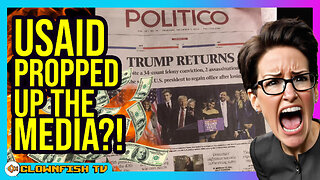 17:40
17:40
Clownfish TV
12 hours agoUSAID Paid for Leftwing Media and Politico CAN'T Pay Their Employees?!
5072 -
 40:21
40:21
Randi Hipper
1 hour agoTHIS COIN IS GOING TO BLOW UP IN 2025! LATEST BITCOIN NEWS
874 -
 34:39
34:39
BonginoReport
5 hours agoWhy Did My Tax Dollars Fund a Terrorist’s Tuition??? (Ep.137) - 02/11/2025
68.7K112 -
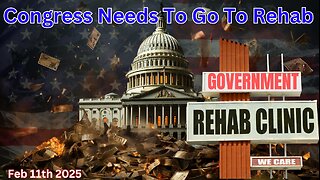 LIVE
LIVE
Wendy Bell Radio
6 hours agoCongress Needs To Go To Rehab
12,174 watching -
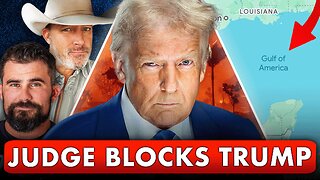 1:23:25
1:23:25
Graham Allen
3 hours agoJudge BLOCKS Trump Fed Worker Buyout Offer!! + Google Has Up-Dated “Gulf Of America” FINALLY!
36.2K26
